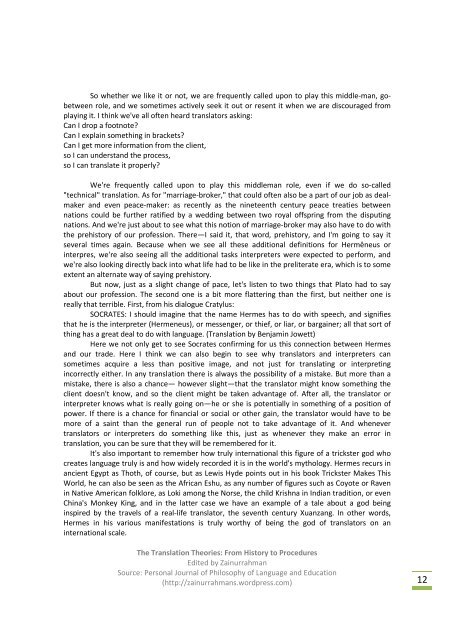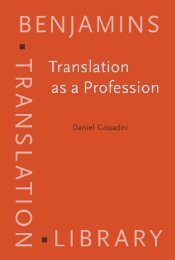Translation Theories.pdf
Translation Theories.pdf
Translation Theories.pdf
You also want an ePaper? Increase the reach of your titles
YUMPU automatically turns print PDFs into web optimized ePapers that Google loves.
So whether we like it or not, we are frequently called upon to play this middle-man, gobetween<br />
role, and we sometimes actively seek it out or resent it when we are discouraged from<br />
playing it. I think we've all often heard translators asking:<br />
Can I drop a footnote<br />
Can I explain something in brackets<br />
Can I get more information from the client,<br />
so I can understand the process,<br />
so I can translate it properly<br />
We're frequently called upon to play this middleman role, even if we do so-called<br />
"technical" translation. As for "marriage-broker," that could often also be a part of our job as dealmaker<br />
and even peace-maker: as recently as the nineteenth century peace treaties between<br />
nations could be further ratified by a wedding between two royal offspring from the disputing<br />
nations. And we're just about to see what this notion of marriage-broker may also have to do with<br />
the prehistory of our profession. There—I said it, that word, prehistory, and I'm going to say it<br />
several times again. Because when we see all these additional definitions for Hermêneus or<br />
interpres, we're also seeing all the additional tasks interpreters were expected to perform, and<br />
we're also looking directly back into what life had to be like in the preliterate era, which is to some<br />
extent an alternate way of saying prehistory.<br />
But now, just as a slight change of pace, let's listen to two things that Plato had to say<br />
about our profession. The second one is a bit more flattering than the first, but neither one is<br />
really that terrible. First, from his dialogue Cratylus:<br />
SOCRATES: I should imagine that the name Hermes has to do with speech, and signifies<br />
that he is the interpreter (Hermeneus), or messenger, or thief, or liar, or bargainer; all that sort of<br />
thing has a great deal to do with language. (<strong>Translation</strong> by Benjamin Jowett)<br />
Here we not only get to see Socrates confirming for us this connection between Hermes<br />
and our trade. Here I think we can also begin to see why translators and interpreters can<br />
sometimes acquire a less than positive image, and not just for translating or interpreting<br />
incorrectly either. In any translation there is always the possibility of a mistake. But more than a<br />
mistake, there is also a chance— however slight—that the translator might know something the<br />
client doesn't know, and so the client might be taken advantage of. After all, the translator or<br />
interpreter knows what is really going on—he or she is potentially in something of a position of<br />
power. If there is a chance for financial or social or other gain, the translator would have to be<br />
more of a saint than the general run of people not to take advantage of it. And whenever<br />
translators or interpreters do something like this, just as whenever they make an error in<br />
translation, you can be sure that they will be remembered for it.<br />
It's also important to remember how truly international this figure of a trickster god who<br />
creates language truly is and how widely recorded it is in the world's mythology. Hermes recurs in<br />
ancient Egypt as Thoth, of course, but as Lewis Hyde points out in his book Trickster Makes This<br />
World, he can also be seen as the African Eshu, as any number of figures such as Coyote or Raven<br />
in Native American folklore, as Loki among the Norse, the child Krishna in Indian tradition, or even<br />
China's Monkey King, and in the latter case we have an example of a tale about a god being<br />
inspired by the travels of a real-life translator, the seventh century Xuanzang. In other words,<br />
Hermes in his various manifestations is truly worthy of being the god of translators on an<br />
international scale.<br />
The <strong>Translation</strong> <strong>Theories</strong>: From History to Procedures<br />
Edited by Zainurrahman<br />
Source: Personal Journal of Philosophy of Language and Education<br />
(http://zainurrahmans.wordpress.com) 12

















